- Home
- Howard Jacobson
Pussy Page 13
Pussy Read online
Page 13
Inspirational, was another. Think big! Aim high! Wow! Thank you, Prince Fracassus.
CHAPTER 23
A short chapter with no lessons to be learnt therefrom
Though Prince Fracassus could sink slowly into oblivion for all Dr Cobalt cared, Professor Probrius was her lover and she was conjoined with him in his enterprise, however little she approved of it. She had to enquire, therefore, whether the Prince did not risk losing supporters from one level of society by his assiduous wooing of supporters from another.
Probrius understood her concerns but thought not. There was a universalism in the Prince’s messages, he believed, which Yoni, who’d seen less of him close up, had not grasped. Take tax … But Yoni Cobalt would not even listen to what Probrius wanted to tell her. So far and no further, she told him. Tax was her red line.
Probrius laughed cynically. ‘The road to hell,’ he said, ‘is paved with politicians’ promises never to cross a red line. At least Fracassus would never make such a promise.’
‘Promising not to make a promise to cross a red line is also a promise,’ Yoni Cobalt said.
It so fell out that the Prince’s next engagement was to judge a beauty pageant. Miss Plasentza. This time it was Professor Probrius who felt uneasy. He strongly advised the Prince against it. It was off-message, he said. You couldn’t tweet Bombs only kill when we’re scarred to kill the killer one minute, and then talk lipstick and deportment the next. But Fracassus knew his own mind. Judging a beauty pageant beat opening department stores and addressing groups of the hard of hearing.
‘I’m very good with beautiful women,’ he said.
Plasentza being a liberal democracy, its beauty contest was tolerated but not much approved of. It was held biennially in a small hotel on the outskirts of the capital and reported only on local radio. Fracassus agreed to participate on the understanding that the organisers booked the largest ballroom in the country, guaranteed the presence of television cameras, and gave him fifteen per cent of the take. Such was the fascination he engendered, his stipulations were met and his percentage increased to twenty.
He had lost much of his shyness. He could look women in the eye now. And not think they all looked like his mother. He had a metallic suit made for the occasion based on the one worn by Spravchik, and on the big night he inspected the contestants as he remembered the Minister inspecting the Numa women, getting the prettiest of them to twerk for him and then open their mouths to show him their teeth. He lowered his voice and asked each of them in turn if she was here only because she needed money to continue her studies. All but one said they wanted to be a model because the world needed beauty. The exception burst out crying. ‘I can’t believe that you can tell that about me,’ she said. ‘It shows,’ he said, ‘it shows.’ He crowned her Miss Plasentza and backstage, after the show, made her cry again by pushing his hand down her dress.
BOMB BOY TYCOON BLOWS HIS TOP the Plasentza Mail reported. But it soon became clear that far from detracting from his burgeoning reputation, the assault helped it burgeon still more. He was a red-blooded young man. He meant what he did as a compliment not a rudeness. He had a love of loveliness in women and was expressing it.
A national debate followed. For many, this was a test case of liberal democracy itself. Enough was enough. People were tired of being told what they could and couldn’t do, could and couldn’t think, could and couldn’t feel. They were fed up with having to feign pity every time the violation alarm was raised by some professional thin-skin who could weep and shake to order. So Fracassus had handled a woman’s breast without remembering to ask her first! People who thought that was a crime needed to live in the real world where violence meant being held up at gunpoint in the food queue and sexism didn’t stop at the misuse of a pronoun.
Women’s magazines carried out polls of their readers. Ninety per cent of women in the lower ranks of society approved the Prince’s action and said they wouldn’t have minded in the least had he done it to them. It reminded some of them, fondly, of being wooed by their husbands. Fracassus tweeted that the ten per cent who disapproved were probably dogs. But he took no notice of any other figures. The people had spoken. The people were his people. And he was their man. Great support, he tweeted.
Sojjourner could fuck off.
‘Unless you want to go on judging beauty pageants,’ Professor Probrius advised, ‘it might be time to think of moving on.’
Fracassus wasn’t sure what Probrius had against him judging further beauty pageants.
‘I don’t think it’s what your father had in mind for you.’
‘He wanted me to see the world. I’m seeing it.’
But then he grew bored himself. There weren’t that many beauty pageants to judge. Could that have been because there weren’t that many beauties in Plasentza? ‘Blame liberal democracy,’ Dr Cobalt told him. ‘The women here value things other than their appearance.’
Fracassus screwed up his face. ‘What other things?’
‘Intellectual development, careers, charitable causes, growing old gracefully.’
‘Is that possible?’ Fracassus asked.
‘Intellectual development?’
‘Growing old gracefully. I think women can be too old.’
‘Too old for what?’
‘Being a woman.’
‘Don’t tweet that, Your Highness,’ Probrius advised.
Lacking the energy for a fight, Fracassus agreed. He had grown listless again. He sat in his room watching television. The world was talking about him but he wasn’t talking about the world. There was nothing for him to do. He would have liked to build a casino or a chamber of horrors while he had time on his hands, but Plasentza had building regulations that Urbs-Ludus did not. He missed Spravchik. He missed women. He couldn’t remember when he had last stood next to a woman who was taller than him. Probrius was right about liberal democracy and beauty – the more you got of the former, the less you got of the latter.
‘What we could really do with,’ he said one evening after dinner, ‘is another bomb.’
And then, in a manner of speaking, one dropped.
CHAPTER 24
On the sadness of things. A son returns, a father prepares to depart
Mortality spares no one, let him build higher than a kite can fly. The Grand Duke fell ill.
It felt, to the people of Urbs-Ludus, like a sign. The Grand Duke was ill because the state was ill.
‘Your father needs you,’ Professor Probrius said. ‘It’s time to say your goodbyes and leave.’
A sadness descended on Fracassus. He realised he had no friends to say goodbye to. ‘What have I achieved here?’ he thought aloud. ‘I haven’t built a casino. I haven’t wrestled. I haven’t had much in the way of pussy.’ (In fact he hadn’t had any pussy but didn’t want to admit that to himself.) ‘The people love me, but I don’t love them.’
He had heard there was a thing called depression. Could it be …?
It was Dr Cobalt he turned to in matters of feeling. ‘It’s the lull before the storm, Your Highness,’ she told him.
‘I’m not asking about the weather,’ Fracassus said. ‘I’m asking about me.’
‘It’s the lull before your storm.’
Fracassus hated metaphors, without knowing what they were, almost as much as he hated foreign languages. ‘What storm?’
Dr Cobalt, who had not had a great year herself, turned the screw. ‘The éclat that’s waiting for you when you return.’
What was waiting for Prince Fracassus on his return can be briefly stated. A dying father. A distraught mother. A flustered Palace. A restive populace. The possibility of war – for when trouble struck one of the Republics the others were unable to resist the opportunity to attack it. Air that had grown filthier in the time Fracassus had been away, though no more remarked upon than in the time he was there. Ditto, substituting heat for filth, the climate. A hunger for change. A dread of change. A virulent mutual distrust that pitted citizen again
st citizen. A passion for saying ‘Love you’ and appending smiley faces to messages expressive only of hate. Technological advance that had so far outstripped any human use for it that people were sending high-definition images of their faeces to imaginary acquaintances on the moon and watching others doing the same on screens they at all times carried in the palms of their hands. A belief in the free market of goods and ideas that concealed a profound reluctance to trade freely in either. A delight in what was gaudy that concealed a contempt for the wealth that made the gaudy possible. A contempt for wealth that concealed a veneration for it. A sense, that is to say, of universal futility and despair for which – and here was the part that interested the Prince – the only antidote was him.
Frac-Ass-Us!
The Republic was waiting for him.
All the Republics were waiting for him.
The Grand Duke received Professor Probrius in the Grand Boudoir. The room was decorated in the Grand Duchess’s taste and so had fairies riding dragons on the walls and, to please her husband, dragons eating fairies on the ceiling. The mattress was fashioned to resemble a gold ingot and for all Probrius knew was a gold ingot. The duvet bore the Origen crest.
Professor Probrius made his deepest bow. ‘I am sorry to see Your Highness brought low,’ he said, ‘but I trust the return of your beloved son will go some way to restoring your health. I believe you will find him much changed and ready for whatever you expect of him.’
The Grand Duke raised a frail hand. ‘How the world loves a braggart,’ he said in a frail voice.
‘I hope you are not dissatisfied with the progress of his education, Professor Probrius said. ‘It goes without saying that neither I nor Dr Cobalt consider it to be finished.’
‘We are more than happy,’ the Grand Duke said. ‘There are qualities of which my dear wife would have liked to see more. And others of which she would have liked to see less. But I confess myself satisfied. We entrusted a rough buffoon to your hands, and you have brought us back a polished one.’
Professor Probrius bowed again. ‘And now, Your Highness?’
‘And now the boy takes over from me as head of the House of Origen, and must prepare himself for the great leap forward. I confess it is all happening sooner than I anticipated and would like. He is young still. But my illness, together with the appeal his youth evidently exerts, combine to give this inevitability. History awaits us, Professor. There are already people below who, finally but fully cognisant of his gifts, are anxious to meet him and discuss how we proceed from here. The significance of this meeting, from their point of view and from ours, cannot be overstated; but time, I fear, is not on anyone’s side. The streets are angry. We must proceed quickly. I am not strong enough myself to sit in on let alone superintend the discussions. I feel confident that your attendance will keep Fracassus focussed and ensure no liberties are taken with him. I have not seen the Prince since his return. I am weak and frankly find his company exhausting. He is said to have my eyes but I never did much like them. He is with his mother at the moment. Those in whose hands the destiny of the Prince and the House of Origen depend are in the Council Chamber on the ninetieth floor. Perhaps you will be so good as to repair there at once. Take Dr Cobalt with you. You have proved a formidable team. I will have the Prince join you presently, if he can tear himself from the bosom of his mother. He was suckled until his fourth year, you know. I put the formation of his character down to that.’
So saying, the Grand Duke fell back on to his pillows. Probrius feared the worse, but in fact His Highness was only sleeping.
It was with a great sense of purpose, to say nothing of a consciousness of history and honour, and therefore in a high state of nervous agitation, that Professor Probrius made his way to the ninetieth floor. He did not know who he was going to encounter in the Council Chamber, whether it would be the Prime Mover of All the Republics himself, or some of his most senior ministers, but the urgency with which the Grand Duke had prepared him clearly pointed to the imminence of a decisive political act – surely not a resignation in the Prince’s favour, but why not a Cabinet position?
He texted Dr Cobalt. Highest shoes, he wrote. And Quick.
In fact she was already in the Chamber when he arrived, and deep in conversation with a person whose relaxed style of dress and free and easy demeanour declared him to be anyone but the Prime Mover.
‘I might as well do the introductions, since I’m here,’ Dr Cobalt said. ‘Professor Probrius meet Lance Folder, Head of Celebrity for Urbs-Ludus Television.’
CHAPTER 25
‘Stop it!’
Whether Prince Fracassus’s distinguished television career could be said to grace the annals of politics or light entertainment was to remain a matter of controversy long after the Prince became what he became. It depended, to a degree, on the point of view of the disputants, and of course on how the Prince’s rise to power, the reasons for it, and the resultant plusses or minuses of his ‘reign’, were viewed in toto.
Despite goodwill and alacrity on all sides, it took a fortuitous slip and then a fortuitous correction to get Fracassus on to the screen. Months were squandered, as the Grand Duke lay dying, debating such basic questions as what exactly it was that Fracassus could do, what his interests were, who would be his target audience, whether he was the stuff of daytime or night-time television, whether he should be scripted or spontaneous, and who, in the final analysis, would have creative control. That Fracassus had no interests, Professor Probrius and Dr Cobalt could have told the producers, but the latter had their own way of drawing the talent out and liked to make their own decisions as to watchability. In the end they reached, in this as in other matters, the same conclusions Dr Cobalt had come to years before. The Prince had no words and no interests and therein lay both his originality and – as could be attested to by the successes he had enjoyed on his travels – his popular appeal. What form to give this most rare of talents remained the stumbling block. Fracassus himself cited Spravchik as a model but Urbs-Ludus wasn’t Cholm. Reality television was of necessity cruel, but there were guidelines, and handing your wife over to the secret police for stealing a flower from someone’s garden breached all of them. The Prince’s other idea was to make a contemporary reality version of The Life and Loves of the Emperor Nero, with himself taking the role of a latter-day emperor, and volunteers, of which there would surely be no shortage, playing Christians (or Muslims, Hindus or Jews – Fracassus was without prejudice). In the original, Nero dipped the Christians or whoever else in burning oil and then employed them as human candles to light his pool parties. The production team was quick to reject this suggestion, but on the grounds of cost rather than morality.
It sometimes happens that a title precedes a programme, indeed can be the inspiration for a programme, and so it proved to be in this case. In the months following his return to Urbs-Ludus, there gathered around the Prince – that is to say around the Prince’s name – a sizeable representation of the Republic’s youth, who discovered in his utterances much that found an echo in their own breasts and, even where his thoughts were unfamiliar to them, much with which they sought to make common cause. In their ebullience, they formed a cheer squad – Fracassites, they called themselves – wherever and on whatever subject the Prince spoke, threatening any members of the audience who showed the slightest inclination to disagree, or who even, by their lights, did not agree emphatically enough. At first they threatened violence without actually doing any. But imperceptibly, the mood of the meetings changed. Impressionable himself, Fracassus found an echo in his breast of the echo of him the Fracassites had found in theirs, and truth to say took pleasure in encouraging them. ‘Chuck ’em out,’ he’d shout, whenever the Fracassites lit upon dissenters, and in the mayhem that ensued – for no sooner did he shout ‘Chuck ’em out’ than everyone was shouting ‘Chuck ’em out’ – the odd bone was broken and a little blood was shed. The Grand Duke ordered Fracassus into his presence.
‘This is
not the way we do things,’ he told his son. ‘Put an end to it.’
Fracassus was disappointed. He’d seen professional wrestlers break more bones on breakfast television. But he couldn’t countermand his dying father. ‘What can I do?’ he asked.
‘It’s not for me to tell you,’ his father said. ‘Have some human decency. And if you don’t have any of your own, steal some.’
Fracassus thought hard and then addressed the Fracassites in a video link. ‘Stop it,’ he said, pointing a finger. He also put up posters in railway stations and at bus stops showing him mouthing the same words. ‘Stop it.’
The phrase gained a sort of currency and finally reached the ears of the television production team. There it was, the thing they’d been looking for all these months. Stop it! Nobody else could deliver those words as Fracassus did. Nobody else could lay hold of so little in the way of moral indignation that what was intended as a reprimand came out sounding like an invitation. ‘Stop it,’ young men sidled up to women and whispered in their ears. And as often as not the stopping it went on through the night.
The moment the programme had a title it had a form. Fracassus would invite wrongdoers – wife-beaters, drug-takers, rapists, alcoholics, pickpockets, body snatchers, arsonists, forgers, cat burglars, paedophiles – to own up to their criminality, and then he’d tick them off for it. Stoppit! No outrage. No holier than thou condescension. No off-putting moralising. No warning or threats. And no bleeding-heart liberal connivance in the criminality either. Just Stoppit!
The advantage to Fracassus himself was obvious. He had only to say two words, and if he forgot those there was always autocue.
The show was an immediate success. It laid bare the immorality at the heart of society, sought neither to extenuate nor forgive, and then shrugged. Pinioned between moralists and apologists all their lives, the people tumbled on to their sofas, heaved sighs of relief that could be heard all over the Republic, and allowed Fracassus to disembarrass them of the ancient burdens of blame and absolution.

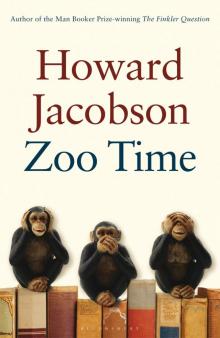 Zoo Time
Zoo Time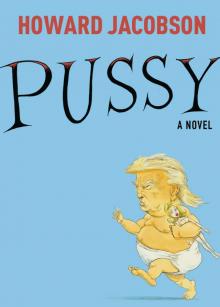 Pussy
Pussy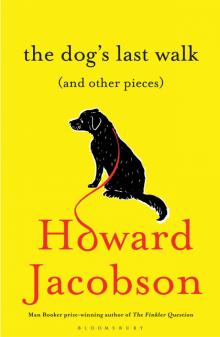 The Dog's Last Walk
The Dog's Last Walk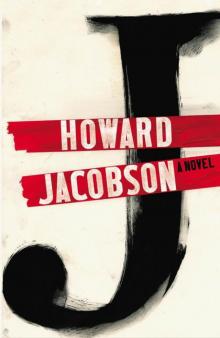 J
J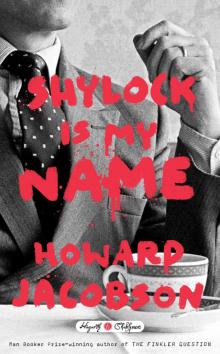 Shylock Is My Name
Shylock Is My Name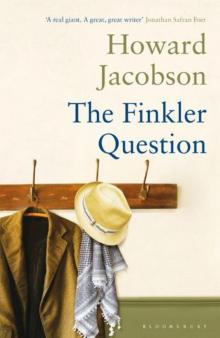 The Finkler Question
The Finkler Question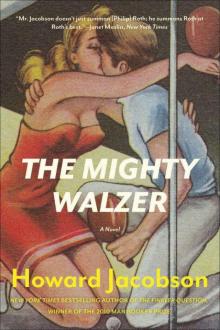 The Mighty Walzer
The Mighty Walzer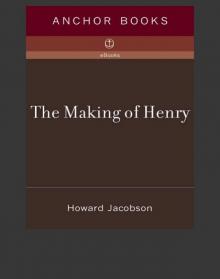 The Making of Henry
The Making of Henry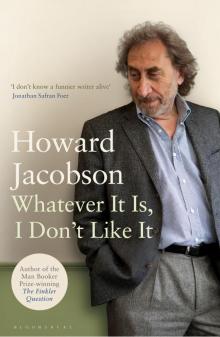 Whatever it is, I Don't Like it
Whatever it is, I Don't Like it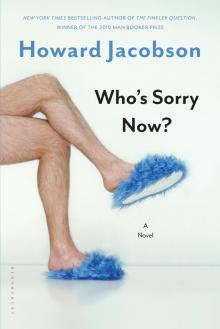 Who's Sorry Now?
Who's Sorry Now? Kalooki Nights
Kalooki Nights